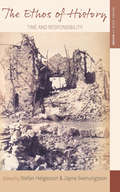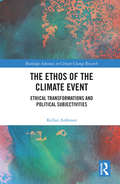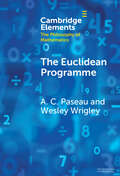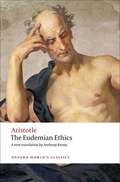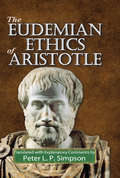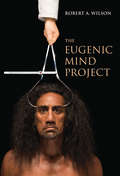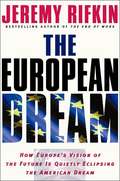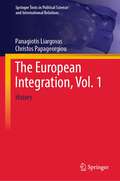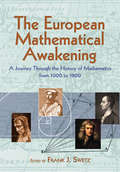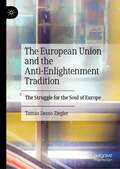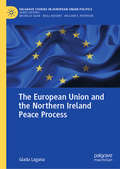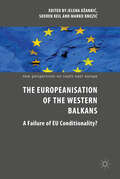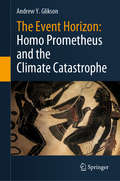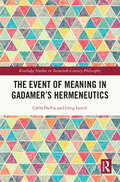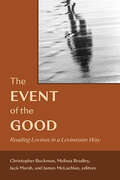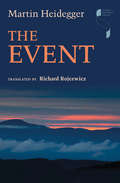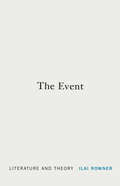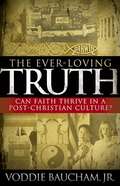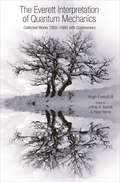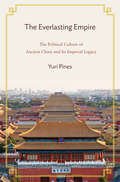- Table View
- List View
The Ethos of History: Time and Responsibility (Making Sense of History #34)
by Jayne Svenungsson Stefan HelgessonAt a time when rapidly evolving technologies, political turmoil, and the tensions inherent in multiculturalism and globalization are reshaping historical consciousness, what is the proper role for historians and their work? By way of an answer, the contributors to this volume offer up an illuminating collective meditation on the idea of ethos and its relevance for historical practice. These intellectually adventurous essays demonstrate how ethos—a term evoking a society’s “fundamental character” as well as an ethical appeal to knowledge and commitment—can serve as a conceptual lodestar for history today, not only as a narrative, but as a form of consciousness and an ethical-political orientation.
The Ethos of History: Time and Responsibility (Making Sense of History #34)
by Stefan Helgesson and Jayne SvenungssonAt a time when rapidly evolving technologies, political turmoil, and the tensions inherent in multiculturalism and globalization are reshaping historical consciousness, what is the proper role for historians and their work? By way of an answer, the contributors to this volume offer up an illuminating collective meditation on the idea of ethos and its relevance for historical practice. These intellectually adventurous essays demonstrate how ethos—a term evoking a society’s “fundamental character” as well as an ethical appeal to knowledge and commitment—can serve as a conceptual lodestar for history today, not only as a narrative, but as a form of consciousness and an ethical-political orientation.
The Ethos of the Climate Event: Ethical Transformations and Political Subjectivities (Routledge Advances in Climate Change Research)
by Kellan AnfinsonThis book develops a politico-ethical response to climate change that accounts for the novelty and uncertainty that it entails. This volume explores the ethical dimensions of climate change and posits that one must view it as a social construction intimately tied to political issues in order to understand and overcome this environmental challenge. To show how this ethos builds upon the need for new forms of responsiveness, Anfinson analyzes it in terms of four features: commitment, worldly sensitivity, political disposition, and practice. Each of these features is developed by putting four thinkers – Kierkegaard, Nietzsche, Schmitt, and Foucault respectively – in conversation with the literature on climate change. In doing so, this book shows how social habits and norms can be transformed through subjective thought and behavior in the context of a global environmental crisis. Presenting a multidisciplinary engagement with the politics, philosophy, and science of climate change, this book will be of great interest to students and scholars of climate change, environmental politics, environmental philosophy and environmental humanities.
The Euclidean Programme (Elements in the Philosophy of Mathematics)
by A. C. Paseau Wesley WrigleyThe Euclidean Programme embodies a traditional sort of epistemological foundationalism, according to which knowledge – especially mathematical knowledge – is obtained by deduction from self-evident axioms or first principles. Epistemologists have examined foundationalism extensively, but neglected its historically dominant Euclidean form. By contrast, this book offers a detailed examination of Euclidean foundationalism, which, following Lakatos, the authors call the Euclidean Programme. The book rationally reconstructs the programme's key principles, showing it to be an epistemological interpretation of the axiomatic method. It then compares the reconstructed programme with select historical sources: Euclid's Elements, Aristotle's Posterior Analytics, Descartes's Discourse on Method, Pascal's On the Geometric Mind and a twentieth-century account of axiomatisation. The second half of the book philosophically assesses the programme, exploring whether various areas of contemporary mathematics conform to it. The book concludes by outlining a replacement for the Euclidean Programme.
The Eudemian Ethics (Oxford World's Classics)
by Aristotle Anthony Kenny"We are looking for the things that enable us to live a noble and happy life. . . and what prospects decent people will have of acquiring any of them. "The Eudemian Ethics is a major treatise on moral philosophy whose central concern is what makes life worth living. Aristotle considers the role of happiness, and what happiness consists of, and he analyses various factors that contribute to it: human agency, the relation between action and virtue,and the concept of virtue itself. Moral and intellectual virtues are classified and considered, and finally the roles of friendship and pleasure. It deals with the same issues as the better-known Nicomachean Ethics, with which it holds three books in common, and its special qualities, as well asthe similarities and differences between the two works, are of fundamental concern to anyone interested in Aristotle's philosophy. This is the first time the Eudemian Ethics has been published in its entirety in any modern language. Anthony Kenny's fine translation is accompanied by a lucid introduction and explanatory notes, which assist the reader in understanding this important work.
The Eudemian Ethics of Aristotle
by Peter L. SimpsonAmong the works on ethics in the Aristotelian corpus, there is no serious dispute among scholars that the Eudemian Ethics is authentic. The Eudemian Ethics is increasingly read and used by scholars as a useful support and confirmation and sometimes contrast to the Nicomachean Ethics. Yet, it remains a largely neglected work in the study of Aristotle's ethics, both among scholars and moral philosophers.Peter L. P. Simpson provides an analytical outline of the entire work together with summaries of each individual section, making the overall structure and detailed argument clear. His translation and explanatory notes include the common books that the Eudemian Ethics shares with the Nicomachean. This translation contains renderings of words and phrases, and proposals for emending the text that differ from what other translators and scholars have adopted.This translation is literal, without expansion or paraphrase, and yet also readable. A readable but literal translation is necessary because in the Eudemian Ethics, more than usual in Aristotle's writings, the logic of the argumentation can turn on the peculiar wording or order. Simpson explains the argumentation where necessary in notes and separate explanatory comments. This book is a fresh, twenty-first-century rendition of the work of one of the most eminent philosophers of all time.
The Eugenic Mind Project (The\mit Press Ser.)
by Robert A. WilsonAn examination of eugenic thinking past and present, from forced sterilization to prenatal screening, drawing on experience with those who survived eugenics.Part science and part social movement, eugenics emerged in the late nineteenth century as a tool for human improvement. In response to perceived threats of criminality, moral degeneration, feeble-mindedness, and “the rising tide of color,” eugenic laws and social policies aimed to better the human race by regulating reproductive choice through science and technology. In this book, Rob Wilson examines eugenic thought and practice—from forced sterilization to prenatal screening—drawing on his experience working with eugenics survivors. Using the social sciences' standpoint theory as a framework to understand the intersection of eugenics, disability, social inclusiveness, and human variation, Wilson focuses on those who have lived through a eugenic past and those confronted by the legacy of eugenic thinking today. By doing so, he brings eugenics from the distant past to the ongoing present. Wilson discusses such topics as the conceptualization of eugenic traits; the formulation of laws regulating immigration and marriage and requiring sexual sterilization; the depiction of the targets of eugenics as “subhuman”; the systematic construction of a concept of normality; the eugenic logic in prenatal screening and contemporary bioethics; and the incorporation of eugenics and disability into standpoint theory. Individual purchasers of this book will receive free access to the documentary Surviving Eugenics, available at EugenicsArchive.ca/film.
The European Dream: How Europe's Vision of the Future Is Quietly Eclipsing the American Dream
by Jeremy RifkinAmericans "live to work" while Europeans "work to live," and Rifkin demonstrates statistically and anecdotally that Europe's humane approach to capitalism makes for a healthier, better-educated populace.
The European Integration, Vol. 1: History (Springer Texts in Political Science and International Relations)
by Panagiotis Liargovas Christos PapageorgiouThis two-volume textbook teaches about the uniqueness and the difficulty of the European unification project. It describes, as clearly as possible, what Robert Schuman declared in 1950, that "... Europe will not be made all at once…". Navigating the nexus of four academic fields - political science, institutional analysis, economics, and history - the book serves as a reference work for accurate, exhaustive, and well-researched information on the creation and functioning of the European Union. Supported by numerous photographs, diagrams, maps, and sources, volume 1 sets out in a concise and readable way the European historical origins, the important steps in the creation of the European Union, and the treaties and historical events that have marked its course so far. Providing a comprehensive picture of the unification process and the functioning of this sui generis edifice of a united Europe, the book will serve as an essential textbook for undergraduate and graduate students studying the subject of European integration, as well as a useful resource for a broader audience interested in the European integration process.
The European Mathematical Awakening: A Journey Through the History of Mathematics from 1000 to 1800
by Frank J. SwetzAbsorbing and entertaining, these thirty-two articles by distinguished educators offer a reader-friendly introduction to the history of mathematics. The newly corrected and updated essays cover eight centuries of discoveries, ranging from the medieval practice of finger calculus to the pioneering work of Leonhard Euler.Fascinating topics include the geometry behind the windows of Gothic churches, the development of complex numbers, the evolution of algebraic symbolism, and mathematical considerations on the trajectory of a cannon ball. Profiles of historic figures include Leonardo Fibonacci, Johannes Kepler, Isaac Newton, Galileo, the Bernoulli family, and other well- and less-known personalities, including mathematicians of the French Revolution and women in mathematics. Suitable for readers with no background in mathematics, this volume offers an excellent guide for high school students and college undergraduates as well as anyone with an interest in the history of mathematics.
The European Union and the Anti-Enlightenment Tradition: The Struggle for the Soul of Europe
by Tamas Dezso ZieglerThis book analyses EU and Member State decision-making through a constructivist perspective and claims that a kind of latent, intellectual &“phantom war&” is going on in Western societies. This war is fought through social practices, political debates, and policy choices for and against the values and ideals of the Enlightenment. The book accurately describes how the values of the Enlightenment and a contrary tradition, the anti-Enlightenment tradition, shape and reshape law and public policy choices in Europe, both at the level of the European Union, and its member states. The hidden war among historical phantoms affects European integration, the values, practices, and policies (including the legal background) of democracy, and the rule of law in our societies. These traditions also affect how we think about humanism and universalism, so they affect EU policies on refugees and other migrants, the role of rationality in public decision-making, and the weakening and defense of checks and balances, only to mention some crucial examples.
The European Union and the Northern Ireland Peace Process (Palgrave Studies in European Union Politics)
by Giada LaganaThis book examines the economic and political contributions of the EU to the Northern Ireland peace process, tracing the genesis of EU involvement since 1979 and analysing how it acted as an arena in which to foster dialogue and positive cooperation. Based on extensive archival research and exclusive elite interviews this volume provides the first comprehensive study of how the EU contributed to the reconfiguration of Northern Ireland from a site of conflict to a site of conflict amelioration and peace-building. The book demonstrates that the relationship between Northern Ireland and the EU has been much more significant in the peace process than previously suggested.
The Europeanisation of the Western Balkans: A Failure of EU Conditionality? (New Perspectives on South-East Europe)
by Soeren Keil Jelena Džankić Marko KmezićThis volume casts a fresh look on how the political spaces of the Western Balkan states (Croatia, Bosnia and Herzegovina, Serbia, Montenegro, Kosovo, Macedonia and Albania) are shaped, governed and transformed during the EU accession process. The contributors argue that EU conditionality in the Western Balkans does not work ‘effectively’ in terms of social change because rule transfer remains a ‘contested’ business, due to veto-players on the ground and strong legacies of the past. The volume examines specific policy areas, salient in the enlargement process and to a different degree incorporated in the accession criteria, as well as EU foreign policy in the spheres of post-conflict stabilisation, democratization and the rule of law promotion.
The Evangelical Counter-Enlightenment: From Ecstasy to Fundamentalism in Christianity, Judaism, and Islam in the 18th Century (Boston Studies in Philosophy, Religion and Public Life #9)
by William R. EverdellThis contribution to the global history of ideas uses biographical profiles of 18th-century contemporaries to find what Salafist and Sufi Islam, Evangelical Protestant and Jansenist Catholic Christianity, and Hasidic Judaism have in common. Such figures include Muḥammad Ibn abd al-Waḥhab, Count Nikolaus Zinzendorf, Jonathan Edwards, John Wesley, Jean-Jacques Rousseau, and Israel Ba’al Shem Tov. The book is a unique and comprehensive study of the conflicted relationship between the “evangelical” movements in all three Abrahamic religions and the ideas of the Enlightenment and Counter-Enlightenment. Centered on the 18th century, the book reaches back to the third century for precedents and context, and forward to the 21st for the legacy of these movements. This text appeals to students and researchers in many fields, including Philosophy and Religion, their histories, and World History, while also appealing to the interested lay reader.
The Evangelicals: The Struggle to Shape America
by Frances Fitzgerald“A page turner…We have long needed a fair-minded overview of this vitally important religious sensibility, and FitzGerald has now provided it.” —The New York Times Book Review “FitzGerald’s brilliant book could not have been more timely, more well-researched, more well-written, or more necessary.” —The American Scholar This groundbreaking book from Pulitzer Prize–winning historian Frances FitzGerald is the first to tell the powerful, dramatic story of the Evangelical movement in America—from the Puritan era to the 2016 presidential election.The evangelical movement began in the revivals of the eighteenth and nineteenth centuries, known in America as the Great Awakenings. A populist rebellion against the established churches, it became the dominant religious force in the country. During the nineteenth century white evangelicals split apart dramatically, first North versus South, and then at the end of the century, modernist versus fundamentalist. After World War II, Billy Graham, the revivalist preacher, attracted enormous crowds and tried to gather all Protestants under his big tent, but the civil rights movement and the social revolution of the sixties drove them apart again. By the 1980s Jerry Falwell and other southern televangelists, such as Pat Robertson, had formed the Christian right. Protesting abortion and gay rights, they led the South into the Republican Party, and for thirty-five years they were the sole voice of evangelicals to be heard nationally. Eventually a younger generation of leaders protested the Christian right’s close ties with the Republican Party and proposed a broader agenda of issues, such as climate change, gender equality, and immigration reform. Evangelicals have in many ways defined the nation. They have shaped our culture and our politics. Frances FitGerald’s narrative of this distinctively American movement is a major work of history, piecing together the centuries-long story for the first time. Evangelicals now constitute twenty-five percent of the American population, but they are no longer monolithic in their politics. They range from Tea Party supporters to social reformers. Still, with the decline of religious faith generally, FitzGerald suggests that evangelical churches must embrace ethnic minorities if they are to survive.
The Event Horizon: Homo Prometheus and the Climate Catastrophe
by Andrew Y. GliksonWith the advent of global warming and the nuclear arms race, humans are rapidly approaching a moment of truth. Technologically supreme, they manifest their dreams and nightmares in the real world through science, art, adventures and brutal wars, a paradox symbolized by a candle lighting the dark yet burning away to extinction, as discussed in this book. As these lines are being written, fires are burning on several continents, the Earth’s ice sheets are melting and the oceans are rising, threatening to flood the planet’s coastal zones and river valleys, where civilization arose and humans live and grow food. With the exception of birds like hawks, black kites and fire raptors, humans are the only life form utilizing fire, creating developments they can hardly control. For more than a million years, gathered around campfires during the long nights, mesmerized by the flickering life-like dance of the flames, prehistoric humans acquired imagination, a yearning for omnipotence, premonitions of death, cravings for immortality and conceiving the supernatural. Humans live in realms of perceptions, dreams, myths and legends, in denial of critical facts, waking up for a brief moment to witness a world that is as beautiful as it is cruel. Existentialist philosophy offers a way of coping with the unthinkable. Looking into the future produces fear, an instinctive response that can obsess the human mind and create a conflict between the intuitive reptilian brain and the growing neocortex, with dire consequences. As contrasted with Stapledon’s Last and first Man, where an advanced human species mourns the fate of the Earth, Homo sapiens continues to transfer every extractable molecule of carbon from the Earth to the atmosphere, the lungs of the biosphere, ensuring the demise of the planetary life support system.”
The Event of Meaning in Gadamer’s Hermeneutics (Routledge Studies in Twentieth-Century Philosophy)
by Carlo DaVia Greg LynchThis book presents the first detailed treatment of Gadamer’s account of the nature of meaning. It argues both that this account is philosophically valuable in its own right and that understanding it sheds new light on his wider hermeneutical project.Whereas philosophers have typically thought of meanings as belonging to a special class of objects, the central claim of Gadamer’s view is that meanings are events. Instead of a pre-existing content that we must unearth through our interpretive efforts, for Gadamer the meaning of a text is what happens when we encounter it in the appropriate way. In events of meaning the world makes itself intelligibly present to us in a manner that is uniquely and irreducibly bound up with the concrete situation in which we find ourselves. When we recognize that Gadamer thinks of meaning in this way, we are better positioned to appreciate what his wider views amount to and how they hang together. Gadamer’s accounts of interpretive normativity, the aspectival character of understanding, and the nature of essences, for example, snap into more vivid relief when we see them as outgrowths of his underlying conception of meanings as events.The Event of Meaning in Gadamer’s Hermeneutics will especially appeal to researchers and advanced students working in hermeneutics, phenomenology, and the philosophy of language. More broadly it will be of interest to humanities teachers and researchers concerned with the question of how texts from distant cultures can be relevant to readers here and now.
The Event of the Good: Reading Levinas in a Levinasian Way
by Christopher Buckman; Melissa Bradley; Jack Marsh; James McLachlanCenters on the ethics of Emmanuel Levinas, aiming to understand this important thinker on his own terms.To read Levinas in a Levinasian way means to understand this important thinker on his own terms, thinking "ethics as first philosophy," without reducing his role to that of a contributor to some other discourse, such as phenomenology, deconstruction, or religious traditions other than his own. This volume offers a variety of interventions into how the priority of the ethical-as formulated by Emmanuel Levinas and seconded by Richard A. Cohen, one of his preeminent interpreters-reorients philosophy to its own questioning-indeed, to its very sense of itself as meaningful. In the decades since Levinas first emerged as a profound and critical voice, many have used his thought to illuminate a broad range of philosophical questions. Often this has occurred in ways that have deemphasized or altered what is arguably Levinas's most radical gesture: reframing philosophy, indeed reframing the meaning of meaning, via an ethical turn. To this end, the essays in this volume, drawing especially on Cohen's reading of Levinas, offer insights into how appropriations and assessments of his philosophy might become more in line with the urgency and full meaning of his notion of the ethical. Whether discussing ethics, aesthetics, politics, or Jewish thought, when taken together, they enhance our comprehension of ethics and Levinas's philosophy of responsibility.
The Event of the Thing
by Michael MarderJacques Derrida's writings often embed the key themes of deconstruction in a notion of the thing. The Event of the Thing is the most complete examination to date of Derrida's understanding of thinghood and its crucial role in psychoanalysis, ethics, literary theory, aesthetics, and Marxism. Arguing that the thing, as a figure of otherness, destabilizes the metaphysical edifice it underlies, Michael Marder reveals the contributions it makes to critiques of humanism and idealism. Subsequently, the new realism that emerges from deconstruction holds the possibility of an event that problematizes all attempts to objectify the thing. An illuminating analysis of Derrida and phenomenology, The Event of the Thing is an innovative and compelling study of a crucial aspect of one of the twentieth century's greatest thinkers.
The Event: Event (Studies in Continental Thought)
by Martin HeideggerThis elegantly translated collection of Heidegger&’s private later writings is &“illuminating to some of his most difficult discussions.&” (Phillip Braunstein, Loyola Marymount College). Martin Heidegger&’s The Event offers the most in-depth articulation of his later work&’s most foundational concept, as well as his most substantial self-critique of his Contributions to Philosophy: Of the Event. Written between 1936 and 1944, and published posthumously as volume 71 of his Complete Works, The Event collects Heidegger&’s private writings in response to his Contributions. Richard Rojcewicz&’s faithful and straightforward translation offers the English-speaking reader intimate contact with the author&’s process of formulating some of his most important concepts. This book lays out how the Event is to be understood and ties it closely to looking, showing, self-manifestation, and the self-unveiling of the gods.
The Event: Literature and Theory
by Ilai RownerWhat is an event? From a philosophical perspective, events are irregular occurrences—moments of change and interruption—categorized by human perception, language, and thought. While philosophers have pored over the subject of events extensively in recent years, The Event: Literature and Theory seeks to ground it: What is literature’s approach to the event? How does literature produce and give testimony to events? Ilai Rowner’s study not only revisits some of the most important thinkers of our time, including Maurice Blanchot, Gilles Deleuze, Jacques Derrida, and Martin Heidegger, it also develops a critical approach to literature that questions the meaning of the literary event through examinations of literary works by Marcel Proust, Louis-Ferdinand Céline, and T. S. Eliot. Rowner offers a new method of thinking about the particular characteristics of the event within literary works and defines the creative value of literature as the aspiration toward the un-happening within the happening. In this study the experience of literature—as an act of both writing and reading—becomes the struggle to capture the excessive movement of the event while also revealing the creative energy within that work of literature.
The Ever-Loving Truth: Can Faith Survive In A Post-Christian Culture?
by Voddie BauchamCan Christian faith survive in a post-Christian culture?
The Everett Interpretation of Quantum Mechanics: Collected Works 1955-1980 with Commentary
by Jeffrey A. Barrett and Peter ByrneHugh Everett III was an American physicist best known for his many-worlds interpretation of quantum mechanics, which formed the basis of his PhD thesis at Princeton University in 1957. Although counterintuitive, Everett's revolutionary formulation of quantum mechanics offers the most direct solution to the infamous quantum measurement problem--that is, how and why the singular world of our experience emerges from the multiplicities of alternatives available in the quantum world. The many-worlds interpretation postulates the existence of multiple universes. Whenever a measurement-like interaction occurs, the universe branches into relative states, one for each possible outcome of the measurement, and the world in which we find ourselves is but one of these many, but equally real, possibilities. Everett's challenge to the orthodox interpretation of quantum mechanics was met with scorn from Niels Bohr and other leading physicists, and Everett subsequently abandoned academia to conduct military operations research. Today, however, Everett's formulation of quantum mechanics is widely recognized as one of the most controversial but promising physical theories of the last century. In this book, Jeffrey Barrett and Peter Byrne present the long and short versions of Everett's thesis along with a collection of his explanatory writings and correspondence. These primary source documents, many of them newly discovered and most unpublished until now, reveal how Everett's thinking evolved from his days as a graduate student to his untimely death in 1982. This definitive volume also features Barrett and Byrne's introductory essays, notes, and commentary that put Everett's extraordinary theory into historical and scientific perspective and discuss the puzzles that still remain.
The Everlasting Check: Hume on Miracles
by Alexander GeorgeAlexander George's lucid interpretation of Hume's "Of Miracles" provides fresh insights into this provocative text, explaining the concepts and claims involved. He also shows why Hume's argument fails to engage with committed religious thought and why philosophical argumentation so often proves ineffective in shaking people's deeply held beliefs.
The Everlasting Empire: The Political Culture of Ancient China and Its Imperial Legacy
by Yuri PinesEstablished in 221 BCE, the Chinese empire lasted for 2,132 years before being replaced by the Republic of China in 1912. During its two millennia, the empire endured internal wars, foreign incursions, alien occupations, and devastating rebellions--yet fundamental institutional, sociopolitical, and cultural features of the empire remained intact. The Everlasting Empire traces the roots of the Chinese empire's exceptional longevity and unparalleled political durability, and shows how lessons from the imperial past are relevant for China today. Yuri Pines demonstrates that the empire survived and adjusted to a variety of domestic and external challenges through a peculiar combination of rigid ideological premises and their flexible implementation. The empire's major political actors and neighbors shared its fundamental ideological principles, such as unity under a single monarch--hence, even the empire's strongest domestic and foreign foes adopted the system of imperial rule. Yet details of this rule were constantly negotiated and adjusted. Pines shows how deep tensions between political actors including the emperor, the literati, local elites, and rebellious commoners actually enabled the empire's basic institutional framework to remain critically vital and adaptable to ever-changing sociopolitical circumstances. As contemporary China moves toward a new period of prosperity and power in the twenty-first century, Pines argues that the legacy of the empire may become an increasingly important force in shaping the nation's future trajectory.
